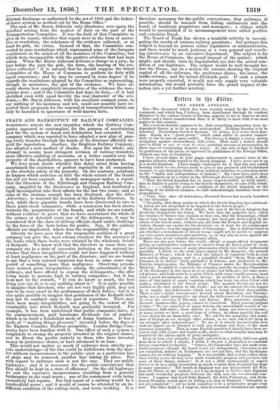FRAUD AND BANKRUPTCY OF RAILWAY COMPANIES. SOMETHING arrests the new
inquiries which the Railway Com- panies appeared to contemplate for the purpose of ascertaining how far the system of fraud and defalcation had extended. One company which was reported to have adopted a new plan of pass- ing every transfer through the hands of its directors officially de- nied the imputation. Another, the Brighton Railway Company, has adopted a new method of Checks. But upon the whole, any attempt to secure more stringent revision of railway transfers, more effective auditing of accounts, or a better control over the property of the shareholders, appears to have been postponed. We very much doubt whether this delay arises from having ascertained the existence of perfect regularity in all companies, or the absolute safety of the property. On the contrary, accidents do happen which convince us that the whole extent of the frauds has not yet been exposed. A Scotch newspaper makes a report, that the Directors of the Edinburgh and Glasgow Railway Com- pany, impelled by the disclosures in England, had instituted a rigid investigation into their affairs for the last two years ; and at some of the stations enough has been disclosed, says the Alloa Advertiser, to warrant the decision of the Railway Directors. In fact, while these gigantic frauds have been discovered in two or three joint-stock companies, while a connexion has been shown between the perpetrators of the frauds, and while we are totally without evidence to prove that we have ascertained the whole of the crimes or detected every one of the delinquents, it may be considered that the class of railway officials stand under challenge by the force of the facts before the public. Nay, if the railway officials are implicated, where does the responsibility stop ?
Already we have seen that the responsible auditors of a great company can give the most solemn vouchers for the accuracy of the books when those books were vitiated by the wholesale frauds of. Redpath. We know well that the directors in more than one company are in a state of excessive irritation at the natural in- ference that these irregularities could not have happened without at least negligence on the part of the directors ; and we are bound to say that a very natural suspicion has been in some eases sug- gested of something more than negligence. Observing persons have noticed gross irregularities among the subordinates of the railways, and have offered to expose the delinquents,—the offer being made to persons high in railway companies ; but it has been met by the remark, ' If you do know so much, the best thing you can do is to say nothing about it." It is quite possible to imagine that directors, who are not very highly paid, may not care to be very exact in the performance of their duties ; but it is also quite possible to imagine that gentlemen of the Redpath tribe may not be confined only to the post of registrars. There may have been many irregularities, not going to the extent of the criminality into which Redpath was gradually betrayed. For example, it has been understood that public companies have, at the commencement, paid handsome dividends out of capital; which is in itself a fraudulent mode of doing business. It was a mode of " making things pleasant," invented before the days of the Eastern Counties Railway prosperity. London Bridge Com- panies have been familiar with it. One effect of such a system is completely to swamp the property invested in the original shares, and to divert the profits entirely to those who have invested money in preference shares, or have advanced it on loan. This would not matter so much if railways were strictly pri- vate undertakings—if the line could be withdrawn from the mar- ket without inconvenience to the public—just as a particular line of ships may be removed, another line taking its place. But with regard to railways such is not the case. They are public highways ; and it is necessary for the public convenience that they should be kept in a state of efficiency. On the old highways we saw the excessive inconvenience resulting from a general bankruptcy in the road trusts ; one of the commonest evils being excessively bad repairs. But bad repair of a railway would be a hundredfold worse ; and it would of course be attended by an in- different condition of the rolling stock, and worse working. It is
therefore n for the public convenience, that railways, if possible, should rescued from falling exclusively into the hands Of bankrupt proprietors and managers ; a climax . which would be precipitated if to mismanagement were added positive and extensive fraud.
The Board of Trade has shown a laudable activity in investi- gating the merits of various railway questions ; but perhaps this subject is beyond its powers either legislative or administrative, and there would be much jealousy at a very general and search- ing interference by an executive department. The subject is for the House of Commons, the grand inquest of the nation`; which might, and should, turn its inquisitorial eye into the actual con- dition of our highways. The subject would be well brought be- fore the House, say on a motion for returns showing the original capital of all the railways, the preference shares, the loans, the traffic-returns, and the actual dividends paid. If such a return were properly executed, it would not only supply. very valuable information, but would probably force the grand inquest of the nation into a yet further scrutiny.
































 Previous page
Previous page